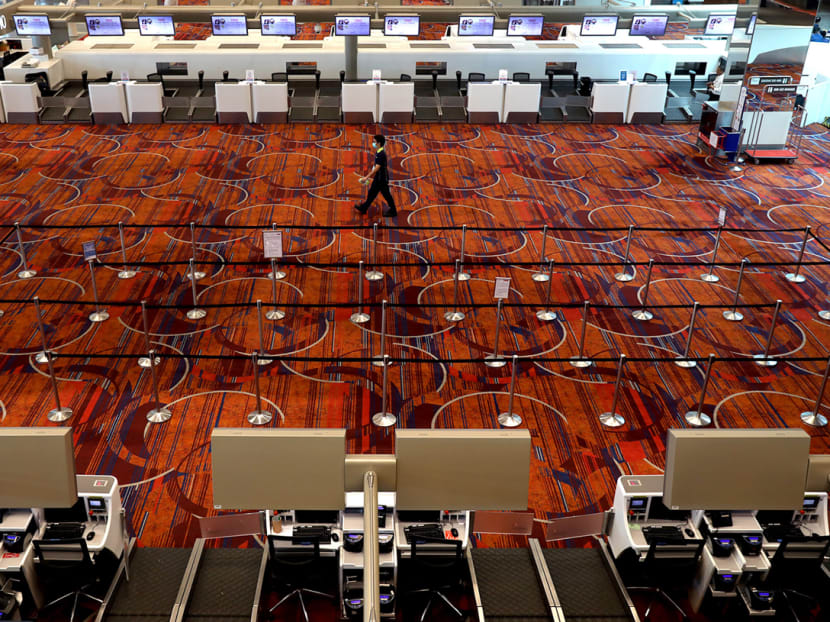Singapore may have to consider replacing 2-week Covid-19 isolation with 'rigorous testing regime' for travellers: Ong Ye Kung
SINGAPORE — Singapore may have to consider replacing the two-week isolation period with a "rigorous testing regime" for arriving travellers, as part of efforts to "revive" the country's air hub, said Transport Minister Ong Ye Kung.

In a Facebook video on Friday, Transport Minister Ong ye Kung said that the decline in international air travel due to the ongoing Covid-19 pandemic has seen Singapore drop from its position as the 7th busiest airport in the world in terms of international passenger traffic.
SINGAPORE — Singapore may have to consider replacing the two-week isolation period with a "rigorous testing regime" for arriving travellers, as part of efforts to "revive" the country's air hub, said Transport Minister Ong Ye Kung.
In a Facebook video on Friday (Aug 14), Mr Ong said that the decline in international air travel due to the ongoing Covid-19 pandemic has seen Singapore drop from its position as the 7th busiest airport in the world in terms of international passenger traffic.
It is now in 50th place, with just 150 aircraft movements per day, compared to more than 1,000 a day previously.
"We have tried to bring back demand in various ways. Cargo planes are still using Changi, but they are only about 5 per cent of total flights pre-Covid-19," said Mr Ong.
"We have started to serve transfer and transit passengers, but even at its peak, they accounted for at most a third of total Changi passenger traffic. Today we are serving only a trickle of that, at 400 passenger movements a day, or 150,000 a year, compared to our pre-Covid 19 volume of close to 20 million a year," he added.
"Our challenge is to restore passenger volume, while keeping virus transmission under control," he said.
Mr Ong's National Day speech to the Ministry of Transport (MOT) was delivered last week.
Singapore needs the "same hunger and enterprise" as it did in the early 1980s when Changi Airport first opened and the country went "all out" to attract airlines to fly here, he added.
International travel could start with other countries and territories where virus transmission risk profiles are "similar to or better than" Singapore's, he said, noting such locations made up about 40 per cent of the country's pre-pandemic passenger volumes.
"But passenger volumes cannot be turned on and off capriciously," he added. "We need to take sensible measures concurrently, proportionate to the risk profile of each country, and make progressive steps as we become more confident."
These could include "unilaterally opening up" to passengers from countries and regions that have kept the coronavirus "under control", as well as the proliferation of reciprocal green lanes for business travel and expanding them to include general travel as well.
"Serving 14 days isolation is a major deterrent to travellers, and we may have to consider replacing this with a rigorous testing regime," he said.
"Health and economic considerations are not at odds — we will find ways to revive our air hub and keep Singapore safe."
He said Singapore has to keep its borders open "to survive", and needs to "connect to the world" to thrive.
"To prosper, we have to be a hub of the global economy," he added.
In his speech, Mr Ong also thanked MOT, as well as the Land Transport Authority and operators SMRT and SBS Transit for the "vast improvement" in train service reliability in recent years.
"The system used to suffer a breakdown longer than five minutes for every 130,000 train-km travelled. Now it is clocking over a million train-km between such breakdowns," he said.
He added that SMRT chief executive Neo Kian Hong had told him during a visit to Tuas Depot recently that the rail operator now devotes 70 per cent of its maintenance efforts to preventive maintenance and 30 per cent to corrective maintenance.
"A few years ago, the ratio was almost flipped the other way around. This is a clear sign that we have turned the corner," said Mr Ong. "As they have done so many times in Singapore, engineers here have saved the day."
"Still, this is not a declaration of victory, but a cautionary bell. What we have today is hard won. We must continue to place maintenance and engineering as a top priority."
Mr Ong also pointed to the cost of operating and maintaining the rail network, as well as renewing ageing assets, noting the country's MRT network would expand to 360km over the next decade, up from 230km today.
"Fare revenue is insufficient to cover these operational expenses," he said, adding that the Government spends S$2 billion every year to subsidise the cost of running the public transport system.
"But an attractive public transport system brings about a greener, fairer and better Singapore, and help us move towards a car-lite nation," he said.
The MOT will work with the Ministry of National Development and the Ministry of Sustainability and the Environment to develop a "comprehensive sustainable development plan" for Singapore, he added. CNA
For more stories like this, visit cna.asia.









